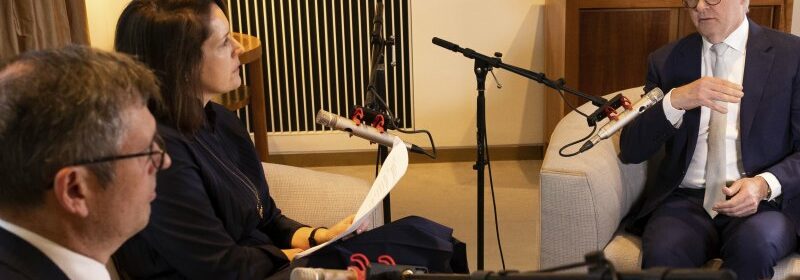Anthony Albanese in his own words

Save articles for later
Add articles to your saved list and come back to them any time.
Prime Minister Anthony Albanese and the government have begun the winter break from federal parliament with some economists warning of a recession, households dealing with rising prices and experts divided on whether the Reserve Bank will lift interest rates again at its meeting on Tuesday.
Speaking exclusively with Inside Politics host Jacqueline Maley and chief political correspondent David Crowe, the prime minister reflected on the purpose of power and some of the challenges ahead.
Prime Minister Anthony Albanese during the interview with David Crowe and Jacqueline Maley at Parliament House.Credit: Alex Ellinghausen
Here is the prime minister in his own words.
On power:
What is the best thing about holding power?
“Power is defined by its use. So using it judiciously, not overusing it for its own sake, using it in the interests of the objectives that you want to achieve. So, already, we have turned around Australia’s position on climate change, we’ve gone from being a pariah in the naughty corner with two or three countries saying no, to actually engaging with our neighbours, but also engaging with the economic opportunities that are there from the transition to a clean energy economy.”
And what is the downside?
“The lack of freedom. Not being able to just drop into the pub by yourself and catch up with someone. Time is the biggest shortage. The demands on my time are quite extraordinary, the pressures that are there as well. But that’s a small price to pay for the incredible privilege that I’ve been given. And it’s not something that I take for granted.“
On America:
Former Labor leader Simon Crean famously argued against the invasion of Iraq in 2003. Would you speak out against United States military action if it was in our national interest for you to do so?
“Absolutely. Australia must always stand up for our national interest. And the other thing is that being a friend and ally, which Australia is of the United States, means not just going along and being subservient. It means actually telling the United States where you think it’s made a position that you disagree with. An example of that at the moment is that on Julian Assange. I’ve made very clear that I have a different position from the United States. I’ve advocated that and will continue to do so. And I think that that’s the job. It’s a bit like the answer to the previous question – true friends around me will tell me if they think I’m getting something wrong. That’s how you need to build a relationship of trust as well. And I’ve built a very positive relationship with President [Joe] Biden and senior members of the Biden administration. We’re very comfortable with each other. And that means that you can have the sorts of discussions which we need to have in today’s very uncertain world where you do have strategic competition in our region.”
On free markets:
You were on the Labor Left before the fall of the Berlin Wall. What was the event that changed your thinking about the market economy?
“I think that markets can be a democratic form, as well, of expression, and they can be a great allocator of resources. And I’ve always had that view. I remember speaking at a forum in Newtown [in Sydney’s inner west], it was very much a broad left forum, and saying what was regarded as heresy – that markets were a democratic form of expression, because I believe that they are. If you want to determine what the best chocolate bar is, the market will tell you. You won’t get that by just talking [about] what’s selling the best. Tim Tams are good biscuits because people buy them. That’s the market in operation. And then resources are allocated to it. But I’ve also always believed that there’s a role for government, there’s a role for the state, in providing people with opportunity and making sure that people don’t get left behind.”
On the Indigenous Voice:
There have been many organisations that have been set up for First Nations people to try to help them. Why would the Voice be any better?
“That’s why constitutional recognition is important, because bodies have come and gone. And because of that experience, Indigenous Australians, when they met at Uluru with the Constitutional Convention, said they wanted recognition but they wanted one that was a particular form. They wanted a mechanism that wasn’t just about the symbolism – which is important – but they wanted a Voice to government to be able to advance their interests. And I think a national Voice that was elected by Indigenous people themselves, that would be able to advocate on their behalf in order to close the gap – which is their eight-year life expectancy gap, the gap in infant mortality, health outcomes, incarceration rates that mean that a young Indigenous male is more likely to go to jail than university. We need to do better than that. And the fact that there will be a referendum – and Australians I hope vote Yes in that referendum – means that that Yes vote will in itself, I think, lift up Indigenous people, will say to them that they are respected. But it will also give weight, I think, to the country. I think that Australians will wake up the day after and feel that the greatest country on earth just got a little bit greater.”
Cut through the noise of federal politics with news, views and expert analysis from Jacqueline Maley. Subscribers can sign up to our weekly Inside Politics newsletter here.
Most Viewed in Politics
From our partners
Source: Read Full Article
